Should We Buy Products with “Sustainable” Palm Oil?
The News
Articles posted on social media routinely direct us to boycott palm oil because its production displaces indigenous communities, kills wildlife, and destroys rainforests, which contributes to climate change. In fact, the cultivation of palm fruit trees is so destructive to the environment and to animals that, to many, palm oil, which is derived from a fruit, is no longer regarded as vegan.
Some products contain palm oil that is labeled “sustainable,” but what does that mean? In an effort to determine whether or not we should be consuming “sustainable” palm oil, TheirTurn spoke to several rainforest and wildlife NGOs; companies that use sustainable palm; and a leader in the production of de-forestation-free palm.

Orangutans, who are displaced, orphaned, kidnapped and killed, have become a symbol of the destructive effects palm oil (photo: Biosprit-subventionen)
What is sustainable palm oil?
In the U.S., palm oil is found in 50% of packaged consumer goods sold in grocery stores. It is widely used because it minimizes separation and is free of trans-fats. NGOs estimate that 18% of palm currently sold comes from sustainable sources.
At the moment, only one organization, the Roundtable on Sustainable Palm Oil (RSPO), has a global certification program, but the criteria are so weak and enforcement so lax that “sustainable” no longer has meaning.
According to a spokesperson at the Rainforest Action Network (RAN), “‘sustainable’ is just a claim; it’s not credible.” For instance, the RSPO will certify palm grown on certain deforested lands. That’s not good enough, according to the RAN, which opposes the clearing of any forest worth conserving. RAN says that the newly-created Palm Oil Innovation Group (POIG) is working to strengthen the RSPO criteria and to pressure the biggest manufacturers to adopt a stronger set of requirements from its growers. The process, however, is slow going.
Should we boycott palm oil?
Palm oil is here to stay for the indefinite future. The vast majority is consumed in countries in Asia and the Middle East where rainforest conservation is a low priority and consumer demand for sustainable products is negligible. If the American, European and Australian NGOs fighting to save the rainforests call for a boycott, then the companies that use palm will have no incentive to purchase it from sustainable sources. After all, why would companies spend more money on sustainable palm if the people who care about sustainability aren’t buying it? That is why many NGOs argue that demanding and buying responsible palm oil will, over time, protect the remaining forests more than boycotting it will.
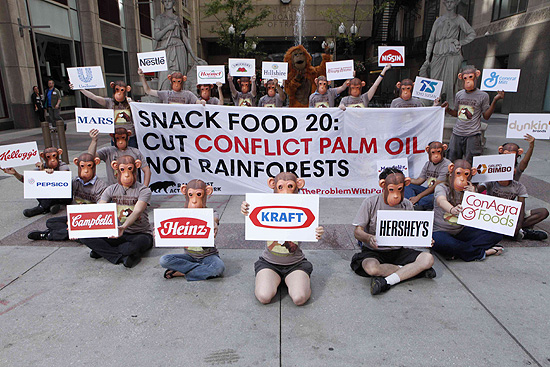
The Rainforest Action Network targets the top 20 companies that use unsustainable, or “conflict,” palm oil.
Following are factors to consider when deciding whether or not to buy packaged foods with palm oil at this point in time
- If “sustainable” is not printed on the label, then you have to assume the palm fruit trees were grown on cleared rainforest.
- If “sustainable” is printed on the label, then the palm oil may or may not have been grown on cleared rainforest.
- Tracing palm oil to the actual land on which it was grown is challenging at the moment. As a result, most consumer products companies don’t know the exact source of their palm oil and should therefore not be making sustainability claims.
- In the U.S., any company can print “sustainable” on its label because the government does not have a regulatory agency to monitor that claim.
Can we eat Earth Balance and Justin’s?
TheirTurn contacted the makers of Earth Balance and Justin’s because they make products with palm oil that are popular with vegans. Both companies buy RSPO-certified palm and appear genuinely eager to ensure that it’s deforestation-free, but, short of hiring investigators to follow their palm vendors, they simply cannot guarantee it at the moment.
However, according to the the Rainforest Action Network, Boulder Brands, the maker of Earth Balance, has “made the strongest palm oil commitment” of any U.S. company, demanding that its suppliers move in the direction of providing the company with palm produced in accordance with the POIG’s strict requirements. Now, Earth Balance needs to work with its supplier to implement this higher standard on the ground in Indonesia and Latin America.
What is Palm Oil?
Palm oil is extracted from the fruit of palm trees that can only be grown in the tropics (show map), the heavily-forested areas near the equator that are often described as “the lungs of the earth.”
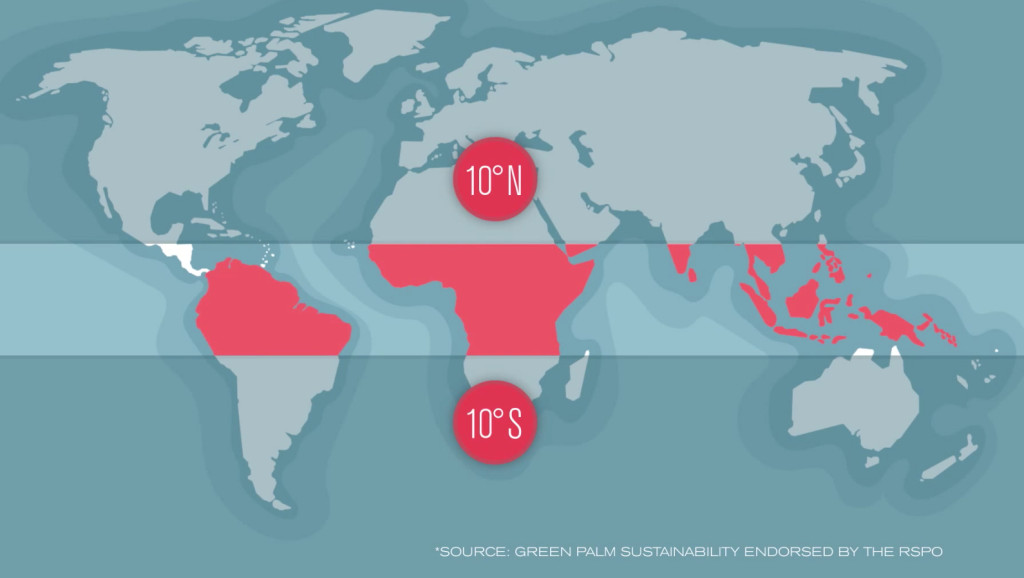
Palm fruit trees can be grown in the tropics, 10 degrees on either side of the equator. About 90% is currently grown in Indonesia (far right)
Once planted, palm fruit trees bear fruit after four years. After 20 years, the trees are chopped down and replanted because plantation workers can no longer reach the fruit bundles. After four cycles, the yield is reduced. Does that mean that palm growers will move their plantations to new land that is covered in forest? It’s too soon to say.
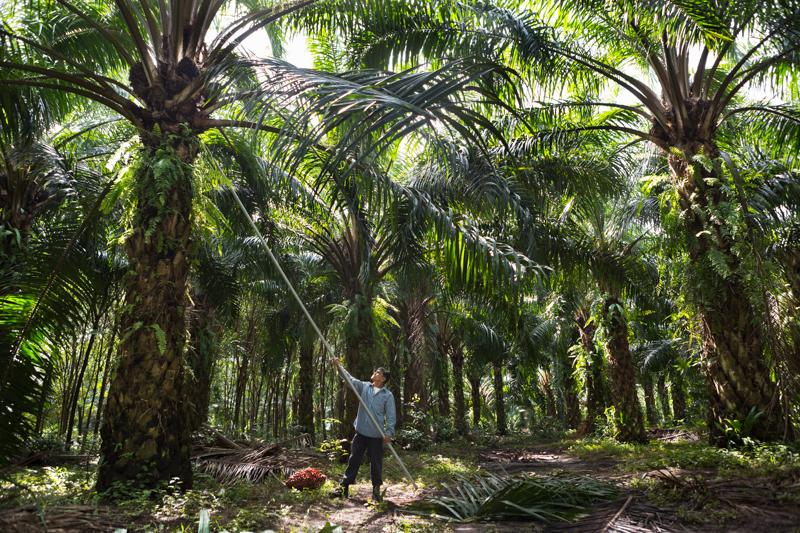
When plantation workers can no longer reach palm fruit bundles, the trees are cut down, and new trees are planted.
If every company that uses palm oil decided to purchase it from responsible sources, would there be enough non-forested land to supply the global demand?
According to the Orangutan Land Trust, an advocacy group that works to preserve orangutan habitat, the island of Borneo alone has 35 million acres of unforested land that is suitable for oil palm cultivation, and that far exceeds projected growth for the next few decades: “It is a complete fallacy that new oil-palm plantations need to come at the expense of forests.”
Your Turn
To find out how you can help protect the planet’s remaining rainforests from being cleared for palm fruit tree plantations, please visit the Rainforest Action Network’s Palm Oil Action Team.



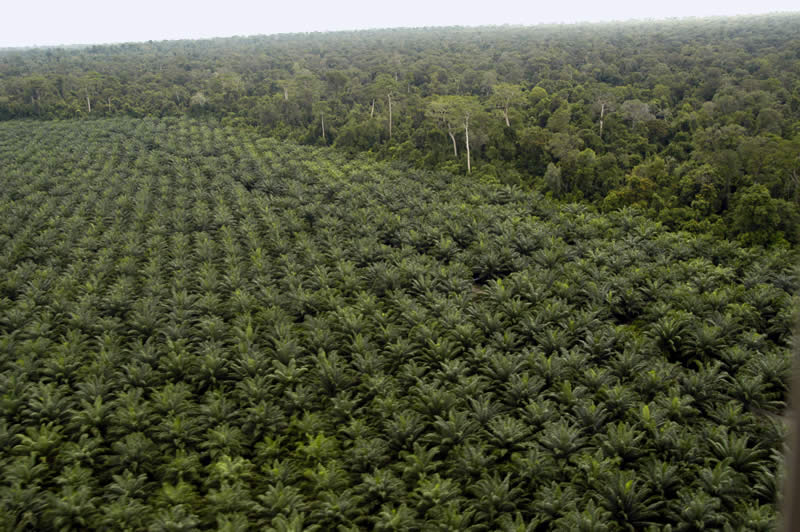

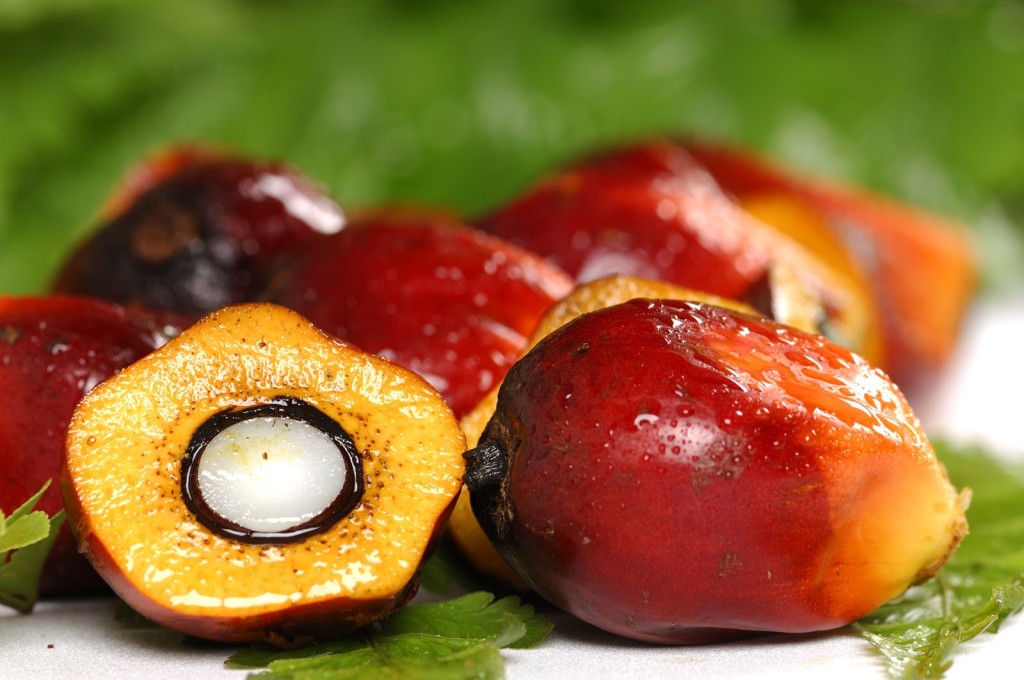
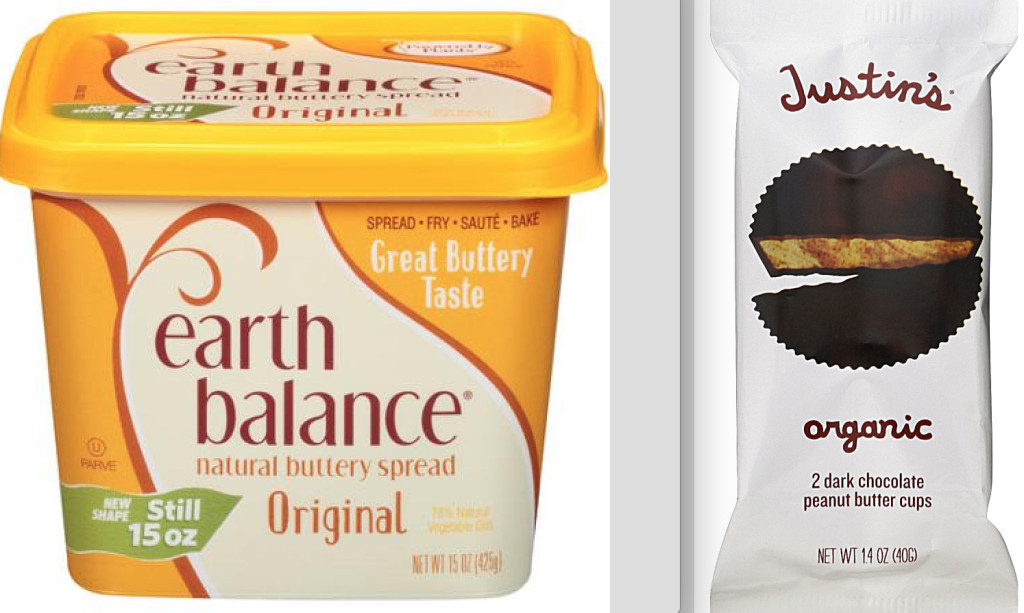

Thanks for sharing words with “Sustainable Palm Oil”, will love to share with others too.
Its amazing to know about Palm Oil and should we buy products or not. In India palm is not used like regularly, may be that’s why we were not aware. Thanks for sharing with us.
https://dbcpl.com/
Thanks for sharing this Sustainable Palm Oil, super excited to try this one with us , will love to try this one.
Thanks for sharing these Sustainable Palm Oil, super excited to try these.
Love to know about Sustainable Palm Oil, amazing one . Thanks for sharing this one with us, will love try this one.
Love to read about this one and thanks for sharing about this important topic, will love to make this one.
Thanks for sharing these important info about sustainable palm oil, love to share this with other.
Actually thanks to you for mentioning this topic, people should aware with this .
Its actually important issue about Palm Oil. Thanks for sharing
Its actually an very important issue . Thanks for sharing this
Thanks for this great information. A few years I stopped buying products containing palm oil (over protests from my family that they miss Double-Stuff Oreos). I’m sure I still wind up with a product here and there that I don’t realize has palm oil, but I’ve very intentionally tried to not add to the demand for this product and the resulting terrible impact such demand has created.
Girl Scout cookies have become my next frontier. This is from the Girl Scout’s website:
https://www.girlscouts.org/en/cookies/all-about-cookies/FAQs.html
“ABC Bakers is a member of the RSPO, an organization of growers, buyers, manufacturers, conservationists, and other interested parties striving to develop and follow best practices to ensure sustainability. The GreenPalm/RSPO logo on Girl Scout Cookie packages baked by ABC Bakers signifies a commitment by our licensed baker to support the production of certified sustainable palm oil. Since 2012, ABC has been purchasing GreenPalm/RSPO credits to cover the palm oil used in the production of Girl Scout Cookies. . Visit the RSPO’s website to learn more about these certificates.”
I’ve read through RSPO and other sources commenting RSPO standards (including your article above), and it sounds like I should add Girl Scout cookies to my no-fly list.
Any thoughts?
Thank you and keep up your vital work!
Regards,
Lisa Bull
Excellent article. There are companies like AgroAmerica in Central and South America that practice fully certified sustainable palm oil production.
https://www.oilexpeller.com/palm-kernel-oil-expeller/
Let’s face it , the only ‘cure’ is a reduction in the human population (and I certainly don’t mean just in the ‘third world’ countries). No-one will touch this elephant in the room, not politicians, not the press, not even environmental causes. Too controversial. So we’ll destroy everything else in the world to maintain our right to procreate as much as we want.
hello,
Thanks for sharing such a beautiful articles about palm oil plz keep sharing https://www.chemocart.com/
I’m researching information about the idea of supposed “organic” palm oil. Is there such a thing? I make hand crafted soaps, and am committed to not using palm oil in my soaps. But my fellow soapers seem to believe they’re doing the right thing by using “sustainable” and “organic” palm oil!
I’d very much appreciate a follow-up through email if anyone can answer my inquiry.
Thank you!!
Hey Beth, I believe there is such a thing. Dr Bronner’s manage their own supply chain of palm oil and ensure that the growers use organic methods of production. Interestingly, (and we’ve written more about this here: https://www.sustainablejungle.com/brand-guides/dr-bronners/ ) the palm oil plantations are based in Ghana where there are no rainforests or orangutans. We think they’ve properly addressed the sustainable palm oil problem. Ecostore, the New Zealand based home and body care manufacturer is another example of a brand that has solved the sustainable palm oil issue (https://www.sustainablejungle.com/brand-guides/ecostore/) by also managing their own supply chain from growing to harvesting to refining. However, they are not organic. On the flipside, Friendly Soap is an example of a British based manufacture who steer clear of using palm oil in their products (we also did a write up of them here: https://www.sustainablejungle.com/brand-guides/friendly-soap/). It seems to us that if you don’t have the resources to actually manage your own supply chain of palm oil it’s almost impossible to know if what you’re buying is indeed sustainable. Unfortunately, the current sustainable palm oil certifications from RSPO (as Donny pointed out above) and Greenpalm are no guarantee that what you’re getting is truly sustainable. Our stance is a short term boycott until such time as companies can honestly claim that their products contain truly sustainable palm oil. Having said that, because palm oil is the most efficient vegetable oil, it has to be the long term solution given the growth in population and decrease in available land. Let me know your thoughts!
I contacted Earth Balance last year and informed that I would be sacrificing the yumminess of my toast and baked goods by forgoing the use of their product because of the inclusion of Palm Fruit Oil. I never received a reply.
I’m tired of these companies that slap the word “vegan” on their products and then put palm oil as part of the ingredients! I gave up on Earth Balance and I let them know. They should change their name to Earth Unbalance!! Then there’s Melt. They use palm oil too. I’m kicking them to the curb and gonna let them know!! I’m going to make my own vegan butter!!
Greed, thanks all it is. It’s a shame that they are willing to destroy the earth and its habitats. Don’t they know without it we will be living on Mars a big dust bold and everything will die.is it really worth it?that about their kids future. Money will be useless, when there is nothing to by. We as humans disstoy everything in our path. It’s a shame. We need to teach our children (in school about the real world of life) instead of mcast.if we don’t do something now. It’s over and thats that. Planet earth will be no more.
Hey Donny, thanks for helping get word out about this important issue!
The claims about Earth Balance don’t seem to line up with their actual actions so far.. People have been urging them to do more for several years (including myself!), and here’s what they say on their site (as of right now):
“Nearly 40% of our palm oil comes from Colombia. Our Colombia-sourced palm oil is 100% organic and is used in all of our organic products. The remaining portion of our palm oil comes from responsible sources in Southeast Asia that are members of the RSPO and leading positive change in that area of the world through conservation of high carbon stock (HCS) forest, influential social programs and more.”
This is from: http://earthbalancenatural.com/responsibility/palm-oil/
Until very recently (perhaps the last month or so), the number was about 30%, and had sat there for many years. (My memory may not be correct, but I also believe it was 30% RSPO, the rest non-RSPO, for a long time.) This number has been very slow to progress.
I also doubt the claim they’ve ““made the strongest palm oil commitment” of any U.S. company,” – there are a number who have refused to buy non-RSPO, or even RSPO (since we know it’s a nearly meaningless certification), opting for better choices. That is commitment. Earth Balance has really been lagging in this area, by my observations. At least their Organic product does less harm..
Also on this page they say they’re “using less than 0.05% of all palm oil”. This is not what concerned people want to hear. People who are concerned are the ones who realize that 100% of the palm they’re buying from Earth Balance is harmful. It’s irrelevant if Earth Balance is 0.0001% or 99% of the total palm market, and demonstrates a business who’s trying to deflect responsibility.
It’s a relief to see they’re planning to switch to 100% POIG by the end of 2015, but this should have happened a lot sooner.
Dave. Thank you for taking the time to post this comment. The maker of Earth Balance, Boulder Brands, is one of many companies that says, “We only use X% of the palm oil cultivated worldwide.” I agree that the point is irrelevant. Companies also say that palm has a high yield compared to other plants from which oils are harvested, but they fail to mention that those trees are NOT grown in the fragile tropics. Lastly, it was an NGO, not Boulder Brands, that said the company has “made the strongest palm oil commitment” of any U.S. company.” I don’t recall the company rep making that claim. Thanks again.
Thank goodness some-one may stop the clearing of Forest…it is needed by our animals for food and homes and to top this, ….THEY WERE THERE BEFORE WE WERE……
Thank you so much for addressing this very important issue. I recently had occasion to inquire about a soap, claiming to be organic/vegan/natural, but containing palm oil…made by the Vermont Soap Company. I wanted to know if it came from sustainable sources. They never answered my letter.